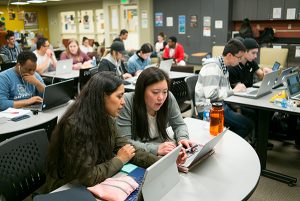
Justice Studies students partnered with Columbia Law School students during an alternative spring break in which pairs worked to help clients expunge their records for misdemeanor and felony charges.(Photo: James Tensuan, ’15 Journalism)
By Barry Zepel
On March 13, San Jose State University undergrads met 12 law students visiting from New York’s Columbia Law School. They spent an intense week helping low-income clients with criminal records prepare to have their convictions expunged. This was the sixth year that a contingent of students from Columbia Law School spent their spring break at SJSU. Each year, the visits have been sponsored by the Chinese Law Society.
Each SJSU student partnered with a law student to work on behalf of their client. By the end of the week, 12 clients had expungement petitions ready to be filed in court.
The week is part of SJSU’s Record Clearance Project (RCP), a program in the College of Applied Sciences and Arts Justice Studies Department. Established in January 2008, the RCP provides undergraduates with practical experience working in the justice system while helping people clear their criminal records in court. Peggy Stevenson, RCP director, created the program nine years ago. She and the RCP staff guide students through the process in classes each semester.
“This year has been particularly exciting because we had the most law students we’ve ever had before, and thus have finished the most clients’ cases,” Stevenson said. “The undergrads and law students work together in teams to benefit their clients and, in the process, learn from each other.”
Angelica Viscarra, a senior justice studies major from SJSU, and Lisa Xia, a second-year law student, were case partners during the week. Their client had been convicted as an accessory to a crime 14 years ago. The client was trying to get it expunged, as she is interested in employment as a caregiver.
“Her mistake was hanging out with the wrong crowd,” Viscarra said. “Her peers had been involved in the criminal activities (of fraud and identity theft). She was convicted of conspiracy because she provided them with a place to stay.”
Xia was thrilled with her week in San Jose.
“This one spoke to me when I was considering various spring break programs that Columbia had information on,” she said. “I was impressed with RCP. I didn’t have (a program like this) as an undergraduate at Georgia Tech. I can see how it has been making great impacts on people’s lives.”
Viscarra is equally enthusiastic about her time with RCP. Indeed, like many of her classmates, she has plans for a career in law.
“While the workload is very heavy, it is very rewarding,” she said. “People come to you for help in getting their records cleared, and we are able to assist.”
Under attorney supervision, students learn to review rap sheets showing an individual’s convictions, to interview clients during drop-in advice sessions and to prepare petitions seeking expungement for the consideration of a judge.
“RCP prepares our students for many types of jobs,” said Anahi Beltran, ’16 Justice Studies, the full-time RCP project coordinator who first became involved with the program when she was a student two years ago. “We’ve had people who have taken the RCP classes and now work in law enforcement. We get a lot of interest from future probation officers. This also is a great program for those who want to go to law school.”
RCP Director Stevenson believes that the RCP is the only program in the country in which undergraduates can take such classes and gain experience providing legal assistance directly to clients. To date, the RCP has filed more than 1,100 petitions in court, with a success rate of 99 percent. Since it requires significant staff assistance to operate, the RCP relies on outside funding, including support from CommUniverCity, grants from Santa Clara County, the city of San Jose, private foundations such as The Health Trust and Castellano Family Foundation, and individual donors.